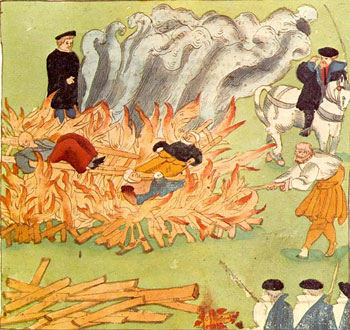
Click open the newspaper and behold: stories of religion, the monotheisms born of desert honor culture particularly, messing something or someone up, often fatally. Click open the international section where conflict and war follow the bloody borders of faiths.
Inter-faith and sectarian aggression have been the primary drivers of war throughout history. In the highly religious Middle East and Islamosphere this is still the case: it’s not for nothing the Holy Land has been called the world’s largest open air mental hospital.
Domestically the horror is nearly as bad. Historically slavery was the high water mark of an in-group/out-group oppression, an institution assiduously defended by most of Christianity at the time. Modern religious apologists try to rewrite history, focusing on the few sects opposed to slavery such as Quakers, some Methodists, etc.- the exceptions.
Closer to our time, the southern churches were on the side of segregation and disenfranchisement in the Civil Rights era, and given Christianity’s lock step alliance with the Republican Party, still are.
Religious apologists muddy the waters noting Dr. King Jr. was a pastor. In so doing they deny the fact that his passive resistance model was actually copied from Gandhi’s Hinduism. If Dr. King had been true to Christianity he’d have been calling for violence and holy war against his enemies like hundreds of generations of clergy before him.

The current Christian-Republican Party alliance, which at times even admits its desire to disenfranchise the black community, is only a political force at all thanks to 60 million Christ clapping Evangelicals.
The electoral realm is not alone either. Our justice system is similarly scarred by the belief in the “Big Three” monotheistic bronze aged fairy tales: Christianity, Islam and Judaism. In all three human conduct is cast as a blind contest between good and evil with retribution being the moving part. In Christianity, one is “born in sin” in opposition to notions of individual dignity and equality as enumerated by Thomas Paine and our founders.
Criminal justice is based on three theories; public protection (keeping us safe from the violent and psychopathic), deterrence, and retribution: just desserts. It is this final goal – retribution or “righteous punishment” which we pursue most actively in the United States thanks to the monotheisms. The results are jaw dropping mandatory minimums, insane sentences and the world’s highest incarceration rate (by a long way) both per capita and in the aggregate. We do a lot of things well in the US, but what we excel at most is incarceration.
By now this religiously fueled retribution is even built in to our economy which is reliant on an underclass (disproportionately black), barred from advancement in retribution often for imaginary or victimless crimes (the drug war) and disenfranchised as further punishment. This includes the vast prison-industrial complex and its exploitative prison labor. This all flies with the “faith community” for whom righteous punishment is an end in itself.
“Righteous punishment” is as much a term of psychology as law: in a clinical setting it refers to a part of our brains, the corpus striatum, “lighting up” like Broadway on a Saturday night with neurotransmitters causing a flash of dopamine and thus pleasure anticipation and endorphins: pleasure itself. It feels gooood to punish.
We can all identify. Even if we don’t attend witch burnings anymore (the secular Enlightenment put that sparky show out of business although the Church didn’t give it up willingly), there is still a deep human satisfaction to watching a wrongdoer get their just desserts. Note the satisfaction when we watch Law and Order and the scoundrel gets sent to the slammer. But vengeance is at the heart of the honor culture based monotheisms which invented “lex talionis” or “an eye for an eye” (Exodus).
Retributive justice and its resultant electoral disenfranchisement is at odds with medical thinking wherein there are discrete and measurable neurological reasons for violence and crime. Violence should be treated as a mental defect that is understood, not a cosmic battle between good and evil, god vs the devil, or some such dangerous nonsense whose real joy is that flash in the corpus striatum mentioned above.
In other countries, particularly in secular Scandinavia and Japan sentences are shorter, jails more humane, and incarceration a last resort. As a result they have lower crime and – importantly – lower recidivism rates than our retributive, religious inspired madness.
Treating violence and crime with more science, saner sentencing and less spite doesn’t harm the necessity of deterrence (serious wrongdoers do go to jail in Scandinavia) because some incarceration for the safety of the public.
Instead, we arrange our lives and societies around holy books, products of the primitive imaginations of ignorant “ancients” who had no idea where the sun went at night or not to defecate in their own drinking water. You will live your whole life and never meet an adult as ignorant as every prophet and scribe of the ancient Middle East: ignorant of every subject, every “ology”.

Yet their toxic philosophies are the foundation of our legal, political and electoral system still. Would you choose to download software built with 2,000 year-old logic onto your computer or fly on a plane built according to first century aeronautics? Yet our morality does just that.
With no shortage of examples of religion’s toll on democracy, we turn our attention to gender equality and even sexual preference. The primacy of the individual regardless of immutable categories like race, gender and sexual preference is essential to democracy and freedom, but assailed again by the Faith Community. You’ll never come up with a religion which doesn’t treat women as second to men or that isn’t at best actively hostile. Further, the more pious an ideology or group get, the worse they treat women and gays.
By their very in-group/out-group nature with a substrate of shame and punishment religions damage human progress, flourishing, science and democracy at every turn. It’s time we grew out of them.
Daniel says
Excellent piece, but don’t leave out the religiously-driven genocide of the Rohingya in Myanmar, which is full-heartedly supported by Buddhist leaders in the country.
David Anderson says
Actually there the “Push” of that genocide is racial. It *looks* – and is cast as – more Buddhist b/c the Tatmadaw (mil intel) in Burma bribed and threatened a bunch of monks to get aboard an ethnic genocide. Al Jaz did a big piece on it about a year ago.
You have to do a lot of heavy lifting to get the canon of Buddhism behind that – something the Japanese did with Bushido, but isn’t operative in Burma.
M4591 says
Or, how humans ruin a good religion? Most if not all faiths contain the Golden Rule. By simply adhering to that one ideal, how great humanity would become! It seems to be the universal law of faith/religion yet the most often ignored.
Wiki: “The Golden Rule is the principle of treating others as one’s self would wish to be treated. It is a maxim that is found in many religions and cultures.[1][2]
The Golden Rule can be considered an ethic of reciprocity in some religions, although other religions treat it differently. The maxim may appear as either a positive or negative injunction governing conduct:
One should treat others as one would like others to treat oneself (positive or directive form).
One should not treat others in ways that one would not like to be treated (negative or prohibitive form).[1]
What you wish upon others, you wish upon yourself (empathic or responsive form).[1]
The idea dates at least to the early Confucian times (551–479 BC) according to Rushworth Kidder, who identifies that this concept appears prominently in Buddhism, Christianity, Hinduism, Judaism, Taoism, Zoroastrianism, and “the rest of the world’s major religions”.[3] The concept of the Rule is codified in the Code of Hammurabi stele and tablets, 1754-1790 BC. 143 leaders encompassing the world’s major faiths endorsed the Golden Rule as part of the 1993 “Declaration Toward a Global Ethic”, including the Baha’i Faith, Brahmanism, Brahma Kumaris, Buddhism, Christianity, Hinduism, Indigenous, Interfaith, Islam, Jainism, Judaism, Native American, Neo-Pagan, Sikhism, Taoism, Theosophist, Unitarian Universalist and Zoroastrian.[4][5] According to Greg M. Epstein, “ ’do unto others’ … is a concept that essentially no religion misses entirely,” but belief in God is not necessary to endorse it.[6] Simon Blackburn also states that the Golden Rule can be “found in some form in almost every ethical tradition”.”
https://en.wikipedia.org/wiki/Golden_Rule
David Anderson says
It actually goes back earlier than what you mention – “reciprocal altruism” is evident in primates. Christianity and the other toxics will be taking credit for standing upright next. Thx for reading. :-)
Jack Jones says
Great article, if the majority of the country could see the judgemental abuse and destruction caused by many religious circles , we could have a active dialogue of how to treat religious influence in politics with more clarity, and have less splintering in the United States thats purposely caused by division issues with all the confusion it brings.